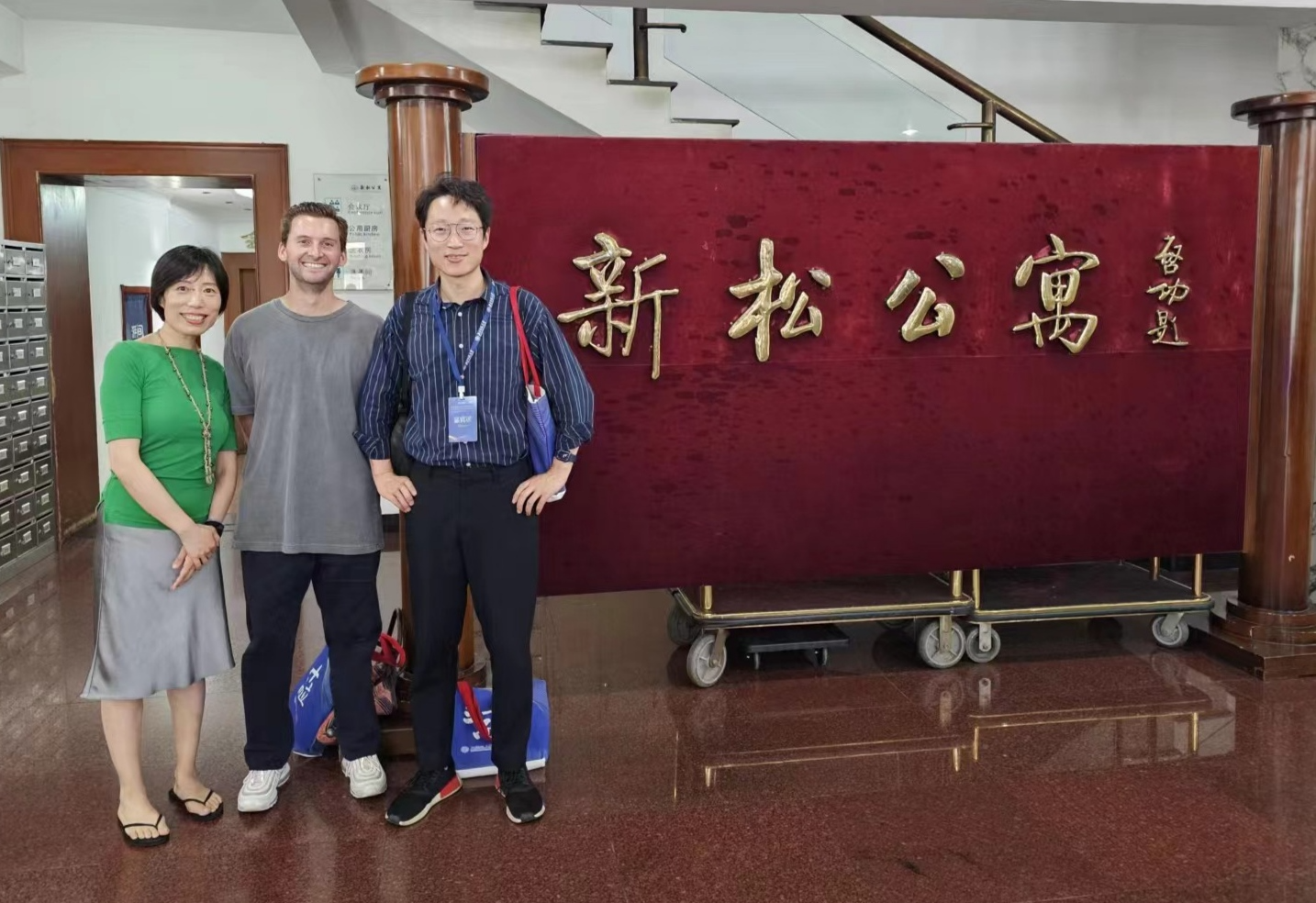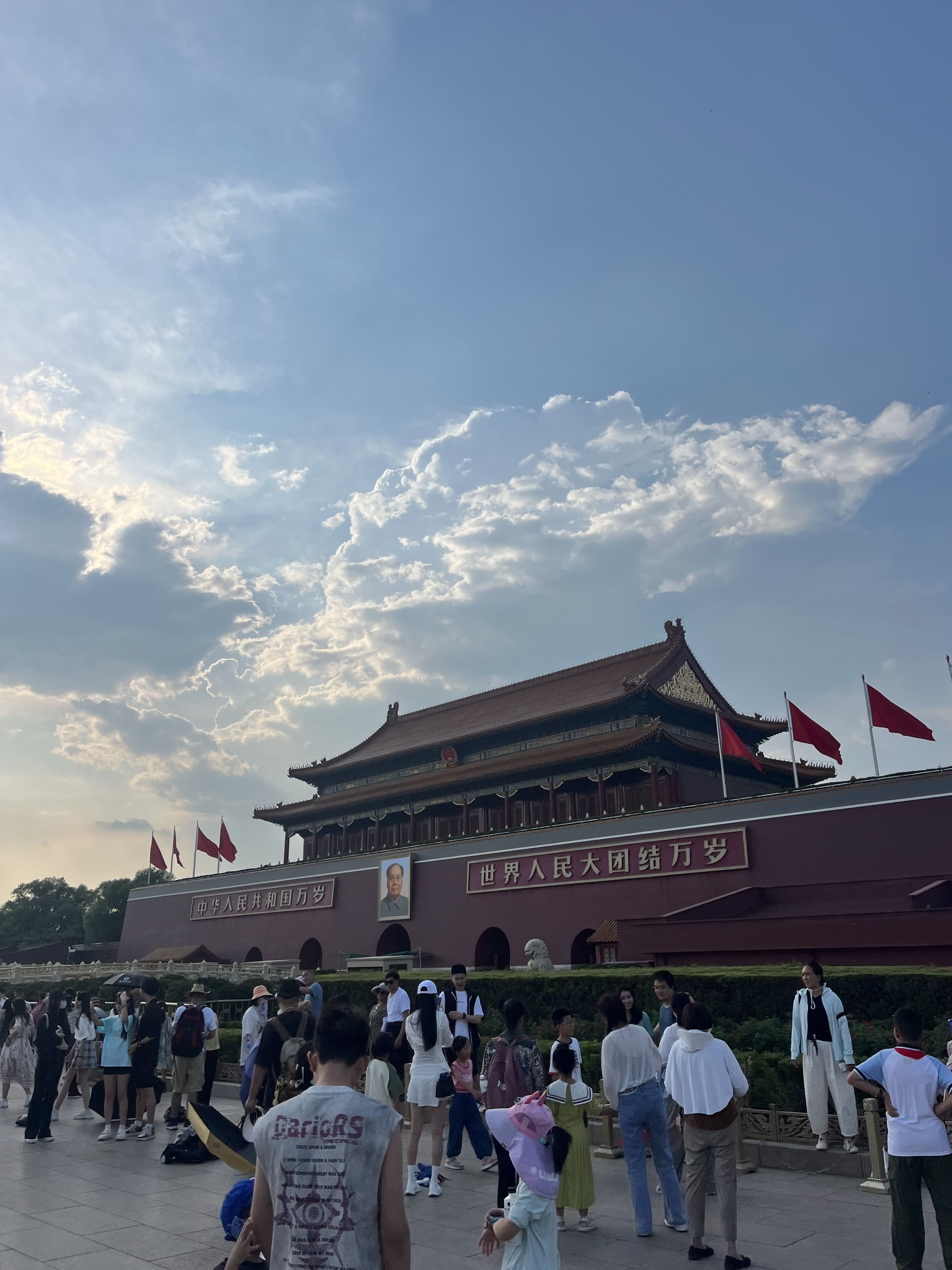Summer Abroad Reflection
By: Blake Kravitz

This summer, I had the incredible opportunity to live and study in Beijing, China, through the Princeton-in-Beijing program at Beijing Normal University. The primary motivation behind seeking out this experience was my deep-rooted interest in US-China relations, a field that I intend to pursue in my future career.
As an international studies and business major, I have long been fascinated by the complex dynamics between the two countries. I recognized that to truly understand these dynamics, it was essential to experience China firsthand. After studying US-China relations in the classroom and participating in internships focused on China, I felt compelled to move beyond theoretical knowledge and engage directly with the people and culture of China. I wanted to see for myself how the country is evolving and how it perceives its relationship with the United States.
While I had previously traveled to China in the summers of 2018 through the Middlebury Interactive Language program and in 2019 through the National Security Language Initiative for Youth scholarship, this recent trip felt markedly different. After several years of focused study and internships related to China, I approached this summer with a deeper sense of purpose. Unlike my earlier, more exploratory visits, this was the first time I traveled to China with the assumption that I would be pursuing a future in US-China relations. I was more attuned to the subtleties of everyday life in China, constantly testing what I had learned in the classroom and engaging with all aspects of the Princeton-in-Beijing experience with a heightened level of seriousness.
During my time in Beijing, I immersed myself in intensive Chinese language courses that were both challenging and rewarding. The Princeton-in-Beijing program is renowned for its rigorous curriculum, and it lived up to its reputation. Students are required to speak exclusively Mandarin Chinese for the duration of the program, pushing me to engage with the language in a deeply immersive way. This environment was instrumental in accelerating my language acquisition. Beyond just the language itself, I gained insights into cultural phenomena and current societal issues in China. I also became more familiar with the tendencies of native Chinese communication, including authentic expressions and the cultural nuances that influence how ideas are conveyed and understood.
However, the experience was far more than just academic. I actively participated in various cultural activities that deepened my understanding of China’s rich traditions and vibrant modern society. From wandering through Beijing’s hutongs and participating in calligraphy workshops to exploring historical landmarks like the Summer Palace and the Forbidden City, each experience provided me with a profound appreciation for Chinese culture and history. These activities were more than just educational—they were moments of connection with the cultural fabric and windows into the daily life of a country that I have studied from afar.

One of the most valuable aspects of the program was the opportunity to engage in conversations with Chinese students on a wide range of topics, including some that are sensitive in the context of US-China relations. These discussions were not always easy. As an American, I often found myself in the position of representing the US perspective on issues that are contentious, such as trade policy, human rights, and global leadership. At the same time, I made a concerted effort to listen to and understand the Chinese perspective, recognizing that mutual understanding and empathy is crucial in any international relationship. These conversations not only broadened my perspective and deepened my understanding of the complexities that define the relationship between our two nations, but they also reinforced my belief in the importance of dialogue and diplomacy in bridging the gap between differing viewpoints.
The friendships I formed during this program were another significant highlight of my summer. I made lifelong connections with both Chinese and American students, many of which I believe will continue to shape my understanding of the world for years to come. These relationships were built on shared experiences, mutual respect, and a willingness to engage in open and sometimes difficult conversations. We supported each other through the challenges of the program and shared in the joys of exploring Beijing together. They are a testament to the power of cultural exchange and the importance of building connections across borders.
However, living in Beijing as an American student was not without its challenges. Being a foreigner in China presented unique difficulties. In a largely homogenous society, I often stood out and was frequently reminded of my status as an outsider. The term “foreigner” was one I heard often, and while it was almost always used innocuously, it was a constant reminder of my difference. Restaurants serving hot water, Western-style toilets being replaced by squat toilets, and air-drying clothes in college dorms instead of drying machines all served as daily reminders of the ways in which I was adjusting to a new environment. This experience of being visibly different and occasionally feeling out of place gave me a new perspective on what it means to be a foreigner in any country. It also deepened my empathy for those who find themselves in similar situations in the United States or elsewhere and heightened my awareness of the importance of open-mindedness in cross-cultural interactions.
Despite these challenges, the experience was overwhelmingly positive. China left a deep and lasting impression on me. After years of studying China in a classroom, being on the ground allowed me to observe firsthand the incredible dynamism and rapid development of the country. One of the most striking aspects of Beijing was the widespread adoption of electric vehicles. It was fascinating to observe how China, a country on the other side of the world, is not only catching up to but, in some ways, surpassing the United States in certain areas of technological development and environmental initiatives. The scale of development in Beijing, from its infrastructure to its emphasis on sustainability, was truly impressive.
This experience was a powerful reminder that China, with its unique blend of ancient traditions and cutting-edge technology, is a country that demands not just understanding, but deep engagement. Having studied China in a classroom setting for years, I arrived with certain expectations and assumptions. However, being on the ground and experiencing the country firsthand challenged many of my assumptions about Chinese politics, the Chinese economy or Chinese society. My eyes were opened to the realities of modern China. I was particularly struck by the rapid pace of infrastructure development, the contrasts in development between first-, second-, and third-tier cities, and the significant investment in public services like transportation. I was impressed by how China is addressing some of the same challenges that the United States faces, often with innovative solutions that could serve as models for other countries.
My motivation for seeking out this experience was rooted in my long-standing interest in US-China relations and my desire to enhance my linguistic competencies and cultural understanding. I have always believed that proficiency in Chinese and a deep understanding of Chinese culture are critical for anyone aspiring to work in this field. This summer solidified that belief and provided me with the foundational tools and insights I need to contribute meaningfully to this area in the future.
As I return to my studies at the University of Pennsylvania, I bring back not only enhanced language skills but also a renewed commitment to fostering mutual understanding between the US and China, along with a deeper understanding of the complexities of US-China relations. This experience has reinforced my commitment to pursuing a career in this field and has provided me with valuable insights that will inform my future studies and professional endeavors. The challenges I faced, the friendships I made, and the lessons I learned will all play a crucial role in shaping my approach to contributing to the ongoing efforts to foster better relations between the United States and China.
When people have asked me to describe my experience in China this summer, I find it difficult to convey in just a few words. However, I’ve realized that this complexity is precisely why it’s so crucial for people to experience China firsthand. Despite the undeniable differences between China and the US, and the tensions at the government level, personal connections are one of the few ways we can truly foster mutual understanding between our two countries. This summer has been a pivotal moment in my academic and professional journey, and I look forward to applying the lessons I’ve learned to my future endeavors.